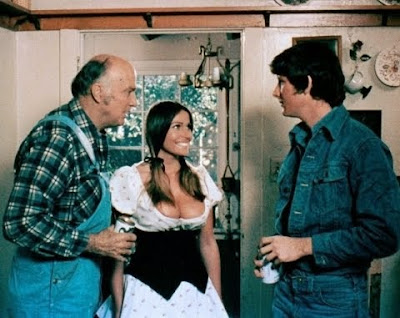Bubba Ho-Tep
 OK, you gotta admit that the plot of 2002's BUBBA HO-TEP is intriguing in a good ol' B-movie sorta way: an elderly Elvis Presley (Bruce Campbell) finds himself in a Texas nursing home and joins forces with a black man (Ossie Davis), who insists he is President John F. Kennedy, against an ancient mummy that prowls their halls at night, sucking the souls out of residents. Imagine the cheesy possibilities.The movie had the most interesting drive-in movie premise since William Castle's 1965 I SAW WHAT YOU DID, the one where 2 girls make random prank phone calls, saying the movie's title, then finding themselves stalked by one of their victims, a guy who just killed his wife.
OK, you gotta admit that the plot of 2002's BUBBA HO-TEP is intriguing in a good ol' B-movie sorta way: an elderly Elvis Presley (Bruce Campbell) finds himself in a Texas nursing home and joins forces with a black man (Ossie Davis), who insists he is President John F. Kennedy, against an ancient mummy that prowls their halls at night, sucking the souls out of residents. Imagine the cheesy possibilities.The movie had the most interesting drive-in movie premise since William Castle's 1965 I SAW WHAT YOU DID, the one where 2 girls make random prank phone calls, saying the movie's title, then finding themselves stalked by one of their victims, a guy who just killed his wife.To add to the pedigree, BUBBA HO-TEP was written and directed by Don Coscarelli, the guy responsible for all those PHANTASM movies, the ones with the flying silver ball that punctured unfortunates' skulls. I was expecting this movie to be vintage exploitation, with lots of gore and nekked women. Talk about being blindsided.
This movie does have some violence and one (very briefly) topless woman, along with some creative vulgarity, but BUBBA HO-TEP, believe it or not, is a very insightful examination of aging, sense of purpose, relevence. I can't recall another low budgeter of this stripe that made so many salient points.
Early in the movie, Elvis' roommate dies suddenly, prompting the latter's daughter to make exactly her second visit to the home, to collect his valuables; the first was when she had admitted him years earlier. Initially, Elvis lusts after her but then a terse dialogue develops between them, her words painfully realistic in reflection of our nation's attitude toward those advanced in years. This film actually seems more interested in examining the ennui and unspeakable sadness that accompany the "golden years" of life than showing graphic bloodletting or icky make-up effects.
Elvis is seen day after day in his squalid room, struggling physically with ambulation and an embarrassing tumor on his private part, as well as mentally with the weight of decades of memories. My grandmother, 98 years of age, has described this feeling. The unimaginable sense of isolation, the lonely nights as she nods off thinking of so many loved ones who have passed. The weight of the memories, years and years of half and clearly remembered good and bad times. The enormity of it makes it hard to breathe, she states.
How did the King end up in a nursing home? Didn't he die in 1977, face down on the carpet while he was on the toilet? BUBBA HO-TEP concocts an amusing alternate reality, playing on the old "Elvis was seen at.." legendry with a convuluted story of how he swapped identities with an Elvis impersonator so he could get up and perform again (and have sweaty panties flung at him from adoring fans). The plans see some unfortunate twists that you can learn of on your own.
The African American man who claims to be JFK (his explanation of this involves, in part, an elaborate skin tinting and prosthesis in his skull at the exit wound) is quite enthusiastic about catching the gauzy predator that hobbles the dim halls and retrieves souls through victims', um, orifices (this is a B movie). Davis turns in a vibrant performance as a throughly delusional conspiracy theorist who is quietly insane but so ingratiating you just can't help but nod your head when he explains of the forces that tried(!) to assassinate him on that gloomy Dallas day. His monologues are equal parts E.C. Comics and (almost) New Yorker satire.
Campbell, well known to B-movie audiences (and fans of Burn Notice) is just as good as a contemplative King, his narration far more poignant than expected. When the final showdown arrives, BUBBA HO-TEP has proven itself far more than just a horror programmer, and the moments after the fade out actually left me feeling more pensive than grossed out.


Comments